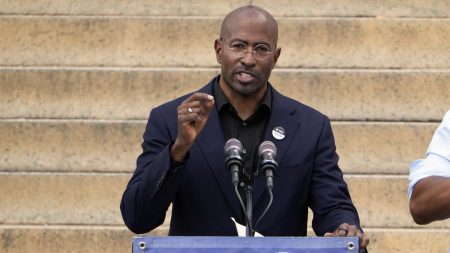People voted in the Pennsylvania primaries on Tuesday, determining races from top to bottom in one of the crucial swing states for November.
President Biden and Donald Trump won in their respective contests, as expected, although both faced protest votes. Pennsylvania is one of the seven major battlegrounds that will determine the winner of the Oval Office on Nov. 5.
Pennsylvania will also be the location of a closely watched Senate race in the fall, as Republican David McCormick, who got Trump's support despite past tensions with the former president, aims to unseat Sen. Bob Casey (D-Pa.)
Meanwhile, Rep. Summer Lee (D-Pa.), a strong progressive critical of Israel's war against Hamas, successfully defended her primary challenge from the center, a significant win for the left.
Here are five main things we learned from Tuesday night's primaries.
Biden and Trump are set for a showdown in the Keystone State
Biden and Trump were almost guaranteed to win their respective primaries on Tuesday night. Still, their wins mark the beginning of a critical time for both men as they vie for the White House.
Currently, Trump leads Biden in Pennsylvania by a small margin, at 47 to 46 percent, according to an average of polls from Decision Desk HQ and The Hill.
Biden recently toured three cities in the Keystone State, including his birthplace of Scranton, where he presented his tax plan to blue-collar workers, before visiting Pittsburgh and Philadelphia.
Meanwhile, Trump held a rally in Schnecksville, Pa., earlier this month, just two days before he was set to go on trial in a case involving alleged hush money payments to a porn star.
Their competing visits highlight the importance of Pennsylvania, which went for Biden in 2020 by about 1 percentage point.
If the polls are any indication, the race this year will be another tight one.
A slow start to a crucial Senate race
McCormick's expected win in the GOP Senate primary confirms his matchup with Casey, the Democratic incumbent, in a race that could determine the majority in the upper chamber next year.
Republicans missed out on a potential gain in the Keystone State last cycle when Sen. John Fetterman (D) defeated Trump-backed Mehmet Oz, who had triumphed over McCormick in the primary.
Now, the GOP hopes that McCormick, who is more aligned with the establishment, will give them a boost in a state where they have struggled in important races. Trump himself recently supported McCormick despite their past differences, showing the party's unity behind the candidate.
Casey currently leads McCormick 46 to 37 percent, according to an average of polls from Decision Desk HQ and The Hill.
Republicans recognize the challenges their candidate faces but remain hopeful that he can succeed despite Casey's name recognition — the Democrat's father, Bob Casey Sr., was a two-time governor of the Keystone State.
Progressives have enduring strength
The left wing has faced continuous questions about its immediate future after many Democrats disagreed with progressives’ position on the Israel-Hamas conflict.
Lee, who easily defended her position against Bhavini Patel, a moderate councilmember from Edgewood, in Pennsylvania’s 12th Congressional District, rejected the idea that progressive officeholders are among the most vulnerable in this election cycle.
Her primary win was actually stronger than her first congressional race, when she barely won against a wave of attacks from special interest groups who spent millions to defeat her. Unlike in that race, the American Israel Public Affairs Committee (AIPAC) and aligned organizations did not significantly involve themselves in Tuesday’s contest.
Lee received thousands of small dollar donations and ultimately raised $2.5 million, the campaign reported on primary day.
Her victory was a success for the grassroots model of campaigning that progressives have popularized within the House, sending unlikely candidates to office and protecting liberal incumbents who Democrats insisted were on shaky standing.
It also provided a much-needed energy boost to the left wing of the party, which has pushed back against centrists who say they have been unhelpful — or outright harmful — to Biden’s first term agenda and his position around the Middle East.
Protest votes show dissatisfaction with Biden, Trump
In a cycle where voters don’t love what’s in front of them, observers were watching closely to see how many protest votes were cast for both Biden and Trump.
Because vote counting on Tuesday did not include the number of “uncommitted” votes, it might be some time before the number of protest ballots cast in the Democratic primary becomes clear. A relatively small number of votes were also cast for Biden’s former primary challenger, Rep. Dean Phillips (D-Minn.).
What was more evident were signs of apparent discontent on the GOP side. Nikki Haley, who dropped out of the Republican primary earlier this year and has yet to endorse Trump, had garnered a vote share in the double digits as of Tuesday night.
While that number didn’t impact Trump’s victory on Tuesday, it could indicate some potential problems for the former president in November.
Pennsylvania is one of the top swing states this cycle, with both Biden and Trump factoring it into their calculations as part of their paths to 270. And in a state where Biden beat his rival in 2020 by roughly a percentage point, every vote counts — suggesting Trump’s allies might have reason to worry that Haley supporters could vote against him or sit out the election entirely.
Biden fared much better than Trump in his respective primary on Tuesday, earning the vast majority — 94.8 percent — of support over Phillips, a fellow moderate. But Phillips’ 5.2 percent should not go unnoticed. The slim number represents a broader problem for Biden — that a portion of his own Democratic base, including centrists, do not want to see him reelected.
While the breakdown of the uncommitted faction is still being determined, the fact that Pennsylvania voters are willing to put forward protest votes in each major party could spell trouble for both presumptive nominees vying for the White House with little fanfare.
Incumbents had a good night
There was some speculation before Tuesday that current officeholders from both parties could lose their positions.
But that did not happen.
The most well-known example was the progressive Lee, who easily defended herself against a challenge from the center of her party.
However, Republican Rep. Brian Fitzpatrick also had a significant primary opponent, in this case from a hardliner in his party.
Anti-abortion activist Matt Houck aimed to replace the moderate incumbent, a former FBI agent who represents a suburban county outside Philadelphia.
Ultimately, it was not even a real competition: Fitzpatrick easily won in a district that would have become much more competitive in November if Houck had won. The Cook Political Report currently considers Fitzpatrick’s seat as “likely Republican,” meaning Democrats will have a tough time flipping it in November.









